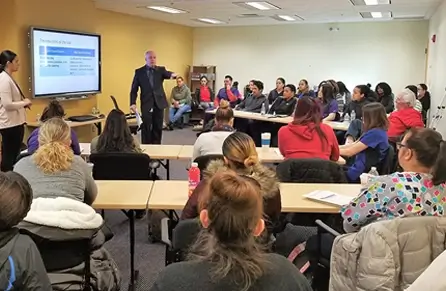Identifying Emerging Trends in Healthcare, Tech, and Trades
As we look towards 2026 and beyond, the landscape of vocational skills is rapidly evolving, particularly in the fields of healthcare, technology, and skilled trades. These sectors are witnessing transformative changes driven by technological advancements and societal needs. In healthcare, the demand for skilled professionals who can navigate digital health technologies is on the rise. Meanwhile, the tech industry is calling for experts in cybersecurity, artificial intelligence, and data analytics. Skilled trades are also evolving, with increased emphasis on sustainable construction and energy-efficient solutions.
At LARE Institute, we recognize the importance of staying ahead of these trends. Our programs are designed to equip you with the knowledge and skills needed to thrive in these dynamic fields, ensuring you remain competitive in the job market.
Essential Skills for Future Job Market Success
To succeed in the future job market, acquiring a blend of technical and soft skills is crucial. Technical skills such as proficiency in digital tools, data analysis, and specific vocational expertise form the backbone of career readiness. Simultaneously, soft skills, including communication, problem-solving, and adaptability, are increasingly valued by employers.
LARE Institute’s supportive and empowering environment nurtures both types of skills, preparing you for a successful career that meets the demands of modern workplaces. By fostering a sense of community and belonging, we help you develop not just as a professional, but as a leader in your field.
LARE’s Cutting-Edge Programs: Preparing for Tomorrow’s Challenges
Our programs are tailored to meet the emerging needs of industries. Whether you’re interested in health science, business technology, or skilled trades, LARE Institute provides a curriculum that is both comprehensive and practical. Our hands-on approach ensures that you gain real-world experience, making you a valuable asset to potential employers.
With personalized support and guidance, each student is empowered to reach their full potential. At LARE, you’re not just gaining skills—you’re joining a community that believes in your potential and stands by you as you build a better future for yourself and your family.
The Role of Continuous Learning in Career Longevity
The ever-changing job market demands a commitment to continuous learning. As technology and industries evolve, so must your skills. LARE Institute emphasizes the importance of lifelong learning and provides opportunities for alumni to return and enhance their skills as needed.
Our commitment to education extends beyond graduation, ensuring that you remain at the forefront of industry advancements. With access to ongoing training and resources, you can confidently navigate your career path, adapting to new challenges and opportunities as they arise.
How Local Businesses Benefit from Future-Ready Graduates
Small to medium-sized businesses (SMBs) in the Andover area face challenges such as high turnover rates and the need for a skilled workforce. By partnering with LARE Institute, businesses gain access to a pipeline of well-trained, locally sourced talent. Our graduates are not only equipped with the necessary technical skills but also embody a strong work ethic and community values.
Partner with us to invest in local talent, and together, we’ll cultivate a workforce that strengthens our community and fulfills your business needs. By hiring LARE graduates, businesses can reduce recruitment costs and enhance their team with individuals who are committed to continuous learning and growth.
Ready to future-proof your career or business? Contact LARE Institute today to explore how our programs can empower you or your organization for success in 2026 and beyond. Join us, and become part of a supportive, empowering community dedicated to transforming lives through education and career development.








